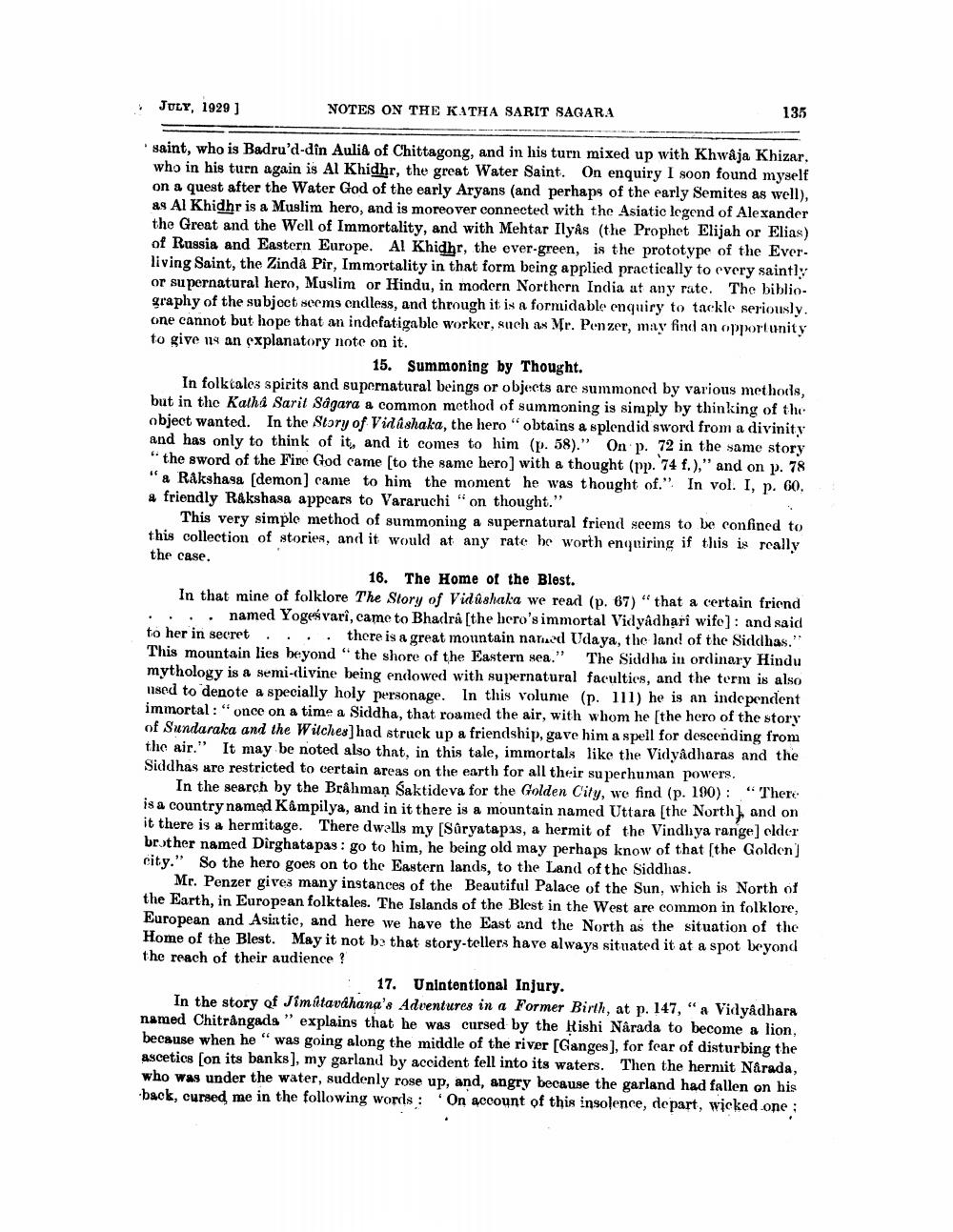________________
JULY, 1929)
NOTES ON THE KATHA SARIT SAGARA
135
waint, who is Badru'd-din Aulia of Chittagong, and in his turn mixed up with Khwaja Khizar, who in his turn again is Al Khidhr, the great Water Saint. On enquiry I soon found myself on a quest after the Water God of the early Aryans (and perhaps of the early Semites as well), as Al Khidhr is a Muslim hero, and is moreover connected with the Asiatic legend of Alexander the Great and the Well of Immortality, and with Mehtar Ilyas (the Prophet Elijah or Elias) of Russia and Eastern Europe. Al Khidhr, the ever-green, is the prototype of the Everliving Saint, the Zinda Pir, Immortality in that form being applied practically to every saintly or supernatural hero, Muslim or Hindu, in modern Northern India at any rate. The bibliography of the subject seems endless, and through it is a formidable enquiry to tackle seriously. one cannot but hope that an indefatigable worker, such as Mr. Ponzer, may find an opportunity to give 114 an explanatory note on it.
15. Summoning by Thought. In folktales spirits and supernatural beings or objects are summoned by various methods, but in the Katha Sarit Sagara a common method of summoning is simply by thinking of the object wanted. In the Story of Vinashaka, the hero "obtains a splendid sword from a divinity and has only to think of it, and it comes to him (p. 58)." On p. 72 in the same story " the sword of the Fire God came to the same hero) with a thought (pp. 74 f.)," and on p. 78 "a Rakshaga [demon) came to him the moment he was thought of." In vol. I, p. 60. a friendly Rakshasa appears to Vararuchi "on thought."
This very simple method of summoning a supernatural friend seems to be confined to this collection of stories, and it would at any rate be worth enquiring if this is really the case.
16. The Home of the Blest. In that mine of folklore The Story of Vidůshaka we read (p. 67) " that a certain friend .... named Yogesvarî, came to Bhaclrå (the hero's immortal Vidyadhari wife): and said to her in secret. .. there is a great mountain namned Udaya, the land of the Siddhas." This mountain lies beyond the shore of the Eastern sea." The Siddha in ordinary Hindu mythology is a semi-clivine being endowed with supernatural faculties, and the term is also used to denote a specially holy personage. In this volume (p. 111) he is an independent immortal : " once on a time a Siddha, that roamed the air, with whom he (the hero of the story of Sundaraka and the Witches] had struck up a friendship, gave him a spell for descending from the air." It may be noted also that, in this tale, immortals like the Vidyadharas and the Siddhas are restricted to certain areas on the earth for all their su pechuman powers.
In the search by the Brâhman Saktideva for the Golden City, we find (p. 190): "There is a country named Kampilya, and in it there is a mountain named Uttara (the North), and on it there is a hermitage. There dwells my [Sûryatapas, a hermit of the Vindhya range) older brother named Dirghatapas: go to him, he being old may perhaps know of that (the Golden) city." So the hero goes on to the Eastern lands, to the Land of the Siddhas.
Mr. Penzer gives many instances of the Beautiful Palace of the Sun, which is North of the Earth, in European folktales. The Islands of the Blest in the West are common in folklore, European and Asiatic, and here we have the East and the North as the situation of the Home of the Blest. May it not be that story-tellers have always situated it at a spot beyond the reach of their audience ?
17. Unintentional Injury. In the story of Jimitavahana's Adventures in a Former Birth, at p. 147, "a Vidyadhara named Chitrangads " explains that he was cursed by the Rishi Narada to become a lion, because when he was going along the middle of the river (Ganges), for fear of disturbing the ascetics (on its banks), my garland by accident fell into its waters. Then the hernit Närada, who was under the water, suddenly rose up, and, angry because the garland had fallen on his back, cursed me in the following words : On account of this insolence, depart, wicked one:




